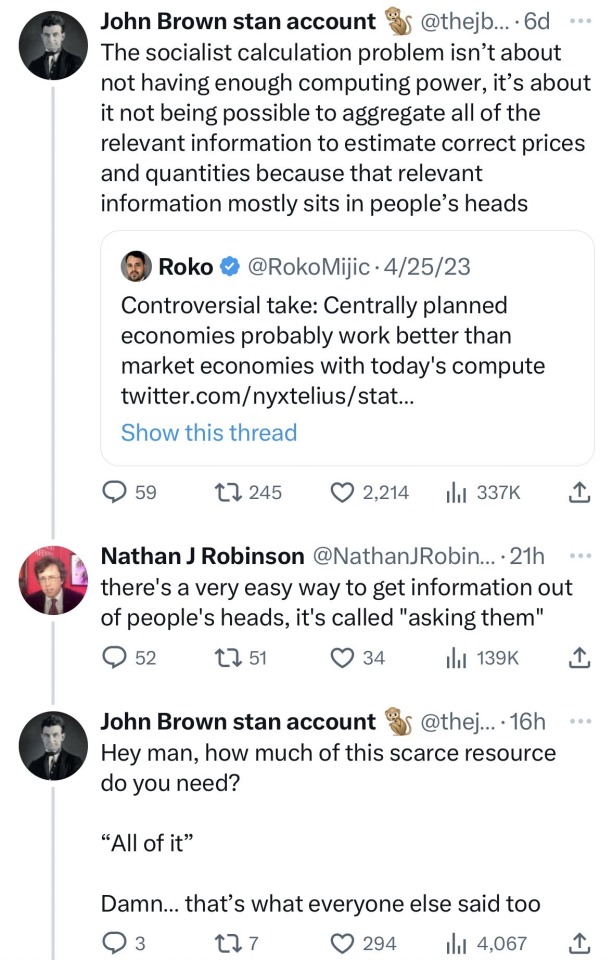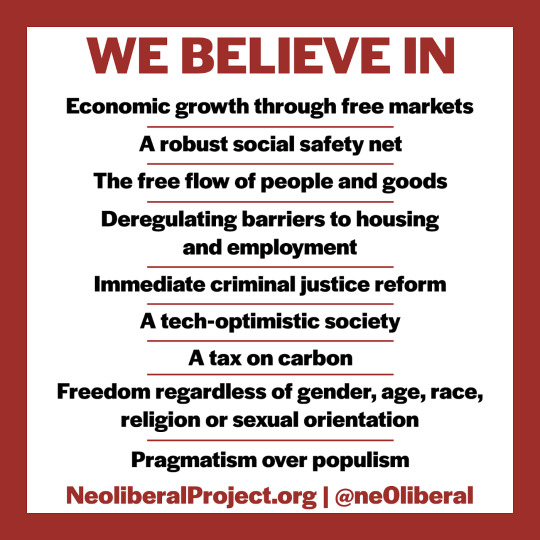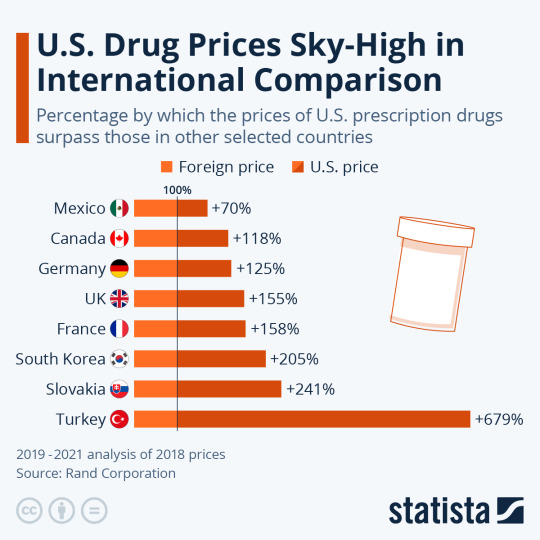#free markets
Text
Socialists are like spoiled young children railing against the state of things in their parents house; the wealthiest house on the block, oblivious to the fact that the very standard by which they judge their condition was created by the system that they condemn. Certainly any peasant in the old world would consider himself a king if he simply had the lot of the common working man today.
247 notes
·
View notes
Text
What comes after neoliberalism?

In his American Prospect editorial, “What Comes After Neoliberalism?”, Robert Kuttner declares “we’ve just about won the battle of ideas. Reality has been a helpful ally…Neoliberalism has been a splendid success for the top 1 percent, and an abject failure for everyone else”:
https://prospect.org/economy/2023-03-28-what-comes-after-neoliberalism/
If you’d like an essay-formatted version of this post to read or share, here’s a link to it on pluralistic.net, my surveillance-free, ad-free, tracker-free blog:
https://pluralistic.net/2023/03/28/imagine-a-horse/#perfectly-spherical-cows-of-uniform-density-on-a-frictionless-plane
Kuttner’s op-ed is a report on the Hewlett Foundation’s recent “New Common Sense” event, where Kuttner was relieved to learn that the idea that “the economy would thrive if government just got out of the way has been demolished by the events of the past three decades.”
We can call this neoliberalism, but another word for it is economism: the belief that politics are a messy, irrational business that should be sidelined in favor of a technocratic management by a certain kind of economist — the kind of economist who uses mathematical models to demonstrate the best way to do anything:
https://pluralistic.net/2022/10/27/economism/#what-would-i-do-if-i-were-a-horse
These are the economists whose process Ely Devons famously described thus: “If economists wished to study the horse, they wouldn’t go and look at horses. They’d sit in their studies and say to themselves, ‘What would I do if I were a horse?’”
Those economists — or, if you prefer, economismists — are still around, of course, pronouncing that the “new common sense” is nonsense, and they have the models to prove it. For example, if you’re cheering on the idea of “reshoring” key industries like semiconductors and solar panels, these economismists want you to know that you’ve been sadly misled:
https://foreignpolicy.com/2023/03/24/economy-trade-united-states-china-industry-manufacturing-supply-chains-biden/
Indeed, you’re “doomed to fail”:
https://www.piie.com/blogs/trade-and-investment-policy-watch/high-taxpayer-cost-saving-us-jobs-through-made-america
Why? Because onshoring is “inefficient.” Other countries, you see, have cheaper labor, weaker environmental controls, lower taxes, and the other necessities of “innovation,” and so onshored goods will be more expensive and thus worse.
Parts of this position are indeed inarguable. If you define “efficiency” as “lower prices,” then it doesn’t make sense to produce anything in America, or, indeed, any country where there are taxes, environmental regulations or labor protections. Greater efficiencies are to be had in places where children can be maimed in heavy machinery and the water and land poisoned for a millions years.
In economism, this line of reasoning is a cardinal sin — the sin of caring about distributional outcomes. According to economism, the most important factor isn’t how much of the pie you’re getting, but how big the pie is.
That’s the kind of reasoning that allows economismists to declare the entertainment industry of the past 40 years to be a success. We increased the individual property rights of creators by expanding copyright law so it lasts longer, covers more works, has higher statutory damages and requires less evidence to get a payout:
https://chokepointcapitalism.com/
At the same time, we weakened antitrust law and stripped away limits on abusive contractual clauses, which let (for example) three companies acquire 70% of all the sound recording copyrights in existence, whose duration is effectively infinite (the market for sound recordings older than 90 is immeasurably small).
This allowed the Big Three labels to force Spotify to take them on as co-owners, whereupon they demanded lower royalties for the artists in their catalog, to reduce Spotify’s costs and make it more valuable, which meant more billions when it IPOed:
https://pluralistic.net/2022/09/12/streaming-doesnt-pay/#stunt-publishing
Monopoly also means that all those expanded copyrights we gave to creators are immediately bargained away as a condition of passing through Big Content’s chokepoints — giving artists the right to control sampling is just a slightly delayed way of giving labels the right to control sampling, and charge artists for the samples they use:
https://doctorow.medium.com/united-we-stand-61e16ec707e2
(In the same way that giving creators the right to decide who can train a “Generative AI” with their work will simply transfer that right to the oligopolists who have the means, motive and opportunity to stop paying artists by training models on their output:)
https://pluralistic.net/2023/02/09/ai-monkeys-paw/#bullied-schoolkids
After 40 years of deregulation, union busting, and consolidation, the entertainment industry as a whole is larger and more profitable than ever — and the share of those profits accruing to creative workers is smaller, both in real terms and proportionally, and it’s continuing to fall.
Economismists think that you’re stupid if you care about this, though. If you’re keeping score on “free markets” based on who gets how much money, or how much inequality they produce, you’re committing the sin of caring about “distributional effects.”
Smart economismists care about the size of the pie, not who gets which slice. Unsurprisingly, the greatest advocates for economism are the people to whom this philosophy allocates the biggest slices. It’s easy not to care about distributional effects when your slice of the pie is growing.
Economism is a philosophy grounded in “efficiency” — and in the philosophical sleight-of-hand that pretends that there is an objective metric called “efficiency” that everyone can agree with. If you disagree with economismists about their definition of “efficiency” then you’re doing “politics” and can be safely ignored.
The “efficiency” of economism is defined by very simple metrics, like whether prices are going down. If Walmart can force wage-cuts on its suppliers to bring you cheaper food, that’s “efficient.” It works well.
But it fails very, very badly. The high cost of low prices includes the political dislocation of downwardly mobile farmers and ag workers, which is a classic precursor to fascist uprisings. More prosaically, if your wages fall faster than prices, then you are experiencing a net price increase.
The failure modes of this efficiency are endless, and we keep smashing into them in ghastly and brutal ways, which goes a long way to explaining the “new commons sense” Kuttner mentions (“Reality has been a helpful ally.”) For example, offshoring high-tech manufacturing to distant lands works well, but fails in the face of covid lockdowns:
https://locusmag.com/2020/07/cory-doctorow-full-employment/
Allowing all the world’s shipping to be gathered into the hands of three cartels is “efficient” right up to the point where they self-regulate their way into “efficient” ships that get stuck in the Suez canal:
https://pluralistic.net/2021/03/29/efficient-markets-hypothesis/#too-big-to-sail
It’s easy to improve efficiency if you don’t care about how a system fails. I can improve the fuel-efficiency of every airplane in the sky right now: just have them drop their landing gear. It’ll work brilliantly, but you don’t want to be around when it starts to fail, brother.
The most glaring failure of “efficiency” is the climate emergency, where the relative ease of extracting and burning hydrocarbons was pursued irrespective of the incredible costs this imposes on the world and our species. For years, economism’s position was that we shouldn’t worry about the fact that we were all trapped in a bus barreling full speed for a cliff, because technology would inevitably figure out how to build wings for the bus before we reached the cliff’s edge:
https://locusmag.com/2022/07/cory-doctorow-the-swerve/
Today, many economismists will grudgingly admit that putting wings on the bus isn’t quite a solved problem, but they still firmly reject the idea of directly regulating the bus, because a swerve might cause it to roll and someone (in the first class seats) might break a leg.
Instead, they insist that the problem is that markets “mispriced” carbon. But as Kuttner points out: “It wasn’t just impersonal markets that priced carbon wrong. It was politically powerful executives who further enriched themselves by blocking a green transition decades ago when climate risks and self-reinforcing negative externalities were already well known.”
If you do economics without doing politics, you’re just imagining a perfectly spherical cow on a frictionless plane — it’s a cute way to model things, but it’s got limited real-world applicability. Yes, politics are squishy and hard to model, but that doesn’t mean you can just incinerate them and do math on the dubious quantitative residue:
https://locusmag.com/2021/05/cory-doctorow-qualia/
As Kuttner writes, the problem of ignoring “distributional” questions in the fossil fuel market is how “financial executives who further enriched themselves by creating toxic securities [used] political allies in both parties to block salutary regulation.”
Deep down, economismists know that “neoliberalism is not about impersonal market forces. It’s about power.” That’s why they’re so invested in the idea that — as Margaret Thatcher endlessly repeated — “there is no alternative”:
https://pluralistic.net/2021/11/08/tina-v-tapas/#its-pronounced-tape-ass
Inevitabilism is a cheap rhetorical trick. “There is no alternative” is a demand disguised as a truth. It really means “Stop trying to think of an alternative.”
But the human race is blessed with a boundless imagination, one that can escape the prison of economism and its insistence that we only care about how things work and ignore how they fail. Today, the world is turning towards electrification, a project of unimaginable ambition and scale that, nevertheless, we are actively imagining.
As Robin Sloan put it, “Skeptics of solar feasibility pantomime a kind of technical realism, but I think the really technical people are like, oh, we’re going to rip out and replace the plumbing of human life on this planet? Right, I remember that from last time. Let’s gooo!”
https://www.robinsloan.com/newsletters/room-for-everybody/
Sloan is citing Deb Chachra, “Every place in the world has sun, wind, waves, flowing water, and warmth or coolness below ground, in some combination. Renewable energy sources are a step up, not a step down; instead of scarce, expensive, and polluting, they have the potential to be abundant, cheap, and globally distributed”:
https://tinyletter.com/metafoundry/letters/metafoundry-75-resilience-abundance-decentralization
The new common sense is, at core, a profound liberation of the imagination. It rejects the dogma that says that building public goods is a mystic art lost along with the secrets of the pyramids. We built national parks, Medicare, Medicaid, the public education system, public libraries — bold and ambitious national infrastructure programs.
We did that through democratically accountable, muscular states that weren’t afraid to act. These states understood that the more national capacity the state produced, the more things it could do, by directing that national capacity in times of great urgency. Self-sufficiency isn’t a mere fearful retreat from the world stage — it’s an insurance policy for an uncertain future.
Kuttner closes his editorial by asking what we call whatever we do next. “Post-neoliberalism” is pretty thin gruel. Personally, I like “pluralism” (but I’m biased).
Have you ever wanted to say thank you for these posts? Here's how you can do that: I'm kickstarting the audiobook for my next novel, a post-cyberpunk anti-finance finance thriller about Silicon Valley scams called Red Team Blues. Amazon's Audible refuses to carry my audiobooks because they're DRM free, but crowdfunding makes them possible.
http://redteamblues.com
[Image ID: Air Force One in flight; dropping away from it are a parachute and its landing gear.]
#pluralistic#crypto forks#economism#imagine a horse#perfectly spherical cows of uniform density on a frictionless plane#neoliberialism#inevitabilism#tina#free markets#distributional outcomes#there is no alternative#supply chains#graceful failure modes#law and political economy#apologetics#robert kuttner#the american prospect
69 notes
·
View notes
Text
My new favorite Twitter thread.

40 notes
·
View notes
Text
Moderna is considering raising the price of its COVID-19 vaccine by over 400 percent—from $26 per dose to between $110 and $130 per dose [in the U.S.] —according to a report by The Wall Street Journal.
The plan, if realized, would match the previously announced price hike for Pfizer-BioNTech's rival COVID-19 vaccine.
Until now, the mRNA-based COVID-19 vaccines from Moderna and Pfizer-BioNTech have been purchased by the government and offered to Americans for free. In the latest federal contract from July, Moderna's updated booster shot cost the government $26 per dose, up from $15–$16 per dose in earlier supply contracts, the Journal notes. Similarly, the government paid a little over $30 per dose for Pfizer-BioNTech's vaccine this past summer, up from $19.50 per dose in contracts from 2020.
But now that the federal government is backing away from distributing the vaccines, their makers are moving to the commercial market—with price adjustments. Financial analysts had previously anticipated Pfizer would set the commercial price for its vaccine at just $50 per dose but were taken aback in October when Pfizer announced plans of a price between $110 and $130. Analysts then anticipated that Pfizer's price would push Moderna and other vaccine makers to follow suit, which appears to be happening now.
Moderna CEO: 400% price hike on COVID vaccine “consistent with the value” | Ars Technica
78 notes
·
View notes
Text

#defi#crypto#thorchain#bitcoin#freedom#liberty#libertarian#voluntaryism#anarchocapitalism#libertarianism#privacy#financialfreedom#free markets#walter wriston#daily quotes#quote of the day
3 notes
·
View notes
Text

12 notes
·
View notes
Photo

(via Authorities Vs. Pawns and Free Market Shops)
0 notes
Text
Institutions, Free Markets, & the Power of Choice
Think about the rules we live by, both big and small. Laws, social norms, even the way companies or groups are organized – those are all institutions. And good institutions are crucial.
Why? Because they set the rules of the game. Clear, consistent rules mean we can make choices, plan ahead, and interact with each other without everything turning into chaos. The best part? We should all have a say in shaping those rules, not just having them shoved down our throats.
This is where free markets kick in. When people have the freedom to buy, sell, start businesses, or walk away from a bad deal, it puts pressure on institutions. The ones that serve us well, that meet our needs – they thrive. The outdated, inflexible, or straight-up unfair ones? They get left behind.
It's like an ongoing vote with our choices. Over time, this shapes institutions that reflect the real needs of the people, not the whims of a powerful few.
#institutions #freemarkets #choice #consent #economics #society #change #powertothepeople
0 notes
Text


Winter Reading
#Winter Reads#Magatte Wade#Jennifer Burns#The Heart of a Cheetah#Milton Friedman: The Last Conservative#Milton Friedman#Foreign AId#Free Markets#Cheetah Generation
1 note
·
View note
Text
"While 'greed' is one of the most popular—and most fallacious—explanations of the very high salaries of corporate executives, when your salary depends on what other people are willing to pay you, you can be the greediest person on earth and that will not raise your pay in the slightest. Any serious explanation of corporate executives’ salaries must be based on the reasons for those salaries being offered, not the reasons why the recipients desire them..”
Thomas Sowell (1930-) American economist.
92 notes
·
View notes
Text
Almost All Cubans Suffer Worst Economic Crisis in the History of the Western Hemisphere
This indictment is handed out by Roberto Alvarez-Quinones, a Cuban journalist, economist and historian who after working in Cuba for Granma and Cuban television stations has been doing that work since 1996 in Los Angeles, California.[1]
Summary of His Indictment
“Never in the history of the entire West has there been such an overwhelming economic and social crisis that it has affected practically…
View On WordPress
#Castroism#Cuban communist claque#Cuban economy#Cuban inflation rate#Cuban minimum wage#Cuban patriciate#Cuban pensions#Cuban sugar production#free markets#poor Cubans#Raul Castro#rich Cubans#Roberto Alvarez Quińones#Ydael Pérez
0 notes
Text
This is not a market.



Call me an idiot who favors competition over price caps and taxing extreme profits/gauging over distorted markets. PBMs look like a tout to me.
0 notes
Text
Allen Mendenhall and Richard Morrison on "Teaching Capitalism"
View On WordPress
0 notes
Text
Data-processing considerations also explain why capitalists favour lower taxes. Heavy taxation means that a large part of all available capital accumulates in one place – the state coffers – and consequently more and more decisions have to be made by a single processor, namely the government. This creates an overly centralised data-processing system. In extreme cases, when taxes are exceedingly high, almost all capital ends up in the government’s hands, and so the government alone calls the shots. It dictates the price of bread, the location of bakeries, and the research-and-development budget. In a free market, if one processor makes a wrong decision, others will be quick to utilise its mistake. However, when a single processor makes almost all the decisions, mistakes can be catastrophic
0 notes
Text
stop asking where Marcille went. she was doing magic research.

prior post
#dungeon meshi#the adventure zone#unintelligible nonsense#I dont know how far along the anime is or if this makes sense since I've only read the manga#Free Market Necronomics is a good pun
2K notes
·
View notes
